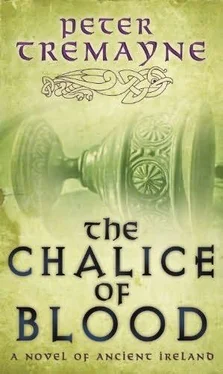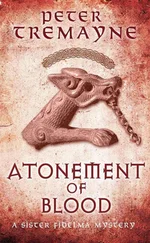Peter Tremayne - Chalice of Blood
Здесь есть возможность читать онлайн «Peter Tremayne - Chalice of Blood» весь текст электронной книги совершенно бесплатно (целиком полную версию без сокращений). В некоторых случаях можно слушать аудио, скачать через торрент в формате fb2 и присутствует краткое содержание. Жанр: Исторический детектив, на английском языке. Описание произведения, (предисловие) а так же отзывы посетителей доступны на портале библиотеки ЛибКат.
- Название:Chalice of Blood
- Автор:
- Жанр:
- Год:неизвестен
- ISBN:нет данных
- Рейтинг книги:5 / 5. Голосов: 1
-
Избранное:Добавить в избранное
- Отзывы:
-
Ваша оценка:
- 100
- 1
- 2
- 3
- 4
- 5
Chalice of Blood: краткое содержание, описание и аннотация
Предлагаем к чтению аннотацию, описание, краткое содержание или предисловие (зависит от того, что написал сам автор книги «Chalice of Blood»). Если вы не нашли необходимую информацию о книге — напишите в комментариях, мы постараемся отыскать её.
Chalice of Blood — читать онлайн бесплатно полную книгу (весь текст) целиком
Ниже представлен текст книги, разбитый по страницам. Система сохранения места последней прочитанной страницы, позволяет с удобством читать онлайн бесплатно книгу «Chalice of Blood», без необходимости каждый раз заново искать на чём Вы остановились. Поставьте закладку, и сможете в любой момент перейти на страницу, на которой закончили чтение.
Интервал:
Закладка:
‘I cannot accept the statement you have made without proof. But I am willing to follow this admonition from the Uraicecht Becc and hear your evidence, Fidelma. If you cannot prove your claim then I must impose a fine on you. Will you attempt to prove it?’
‘It shall be proved,’ Fidelma replied, ‘and in the words of Brother Donnchad himself.’
‘How can that be?’ called out Brother Lugna, with a sneer. ‘Are you going to practise witchcraft and conjure him from his grave?’
There were gasps of horror at his words and several of the brethren performed the sign of the Cross.
‘That is unworthy of you, Brother Lugna,’ snapped Brehon Aillín. ‘There should be no need to remind you of the reputation of the learned advocate in this kingdom and even beyond.’
‘I will explain,’ Fidelma said. ‘The words of Brother Donnchad were written down before his death and hidden because he feared, correctly, that someone might kill him and destroy them. They certainly did their best to do so. They removed all traces of his writings and documents from his room, just in case his words were hidden among them. Thankfully, they were not and they have survived.’
‘Do you mean to present them before us?’ asked Brehon Aillín.
‘I will do so although I am loath to as Brother Donnchad presents some disturbing arguments as to why he lost his Faith.’
There was some confusion in the refectorium .
‘And have you proof that they were written by him?’ pressed the judge.
‘I can present someone who can testify to the handwriting of Brother Donnchad for I have learnt that each scribe forms letters in his own way and has a particular style of writing. Further, I will present the person to whom Brother Donnchad gave this writing, with the request that it be hidden.’
There was now silence.
‘Very well,’ Brehon Aillín said after a quick consultation with Colgú and Abbot Ségdae. ‘You may sum up what Brother Donnchad said in this work on condition that the work is afterwards presented to us and verified to be his work.’
‘I can do that simply. I do not have to remind you that Brother Donnchad was a talented scholar, able to read and write several languages. The librarian of this abbey, Brother Donnán, has pointed out on several occasions that Brother Donnchad wasmost interested in the works of the early believers in the Faith — indeed, in the very origins of how the Faith spread from the Holy Land across the world.’
‘That is not denied.’ Abbot Iarnla was frowning. ‘He was always interested in those origins.’
‘For Brother Donnchad, his pilgrimage to the Holy Land was a golden opportunity to further his studies. What concerned him were the references to James in the scriptures, particularly in the gospels according to Mark and Matthew, and in the epistle to the Galatians. James was said to be the brother of the Christ and executed by the Romans some thirty years after the execution of Jesus. The references were to James Adelphotheos, Brother of the Lord.’
‘That’s nonsense!’ cried Brother Lugna, standing up. ‘The name was miswritten, it was mistranscribed. The name should have been James Alphaeus, who-’
‘I cannot debate the translation,’ cut in Fidelma. ‘I do not have that scholarship. I am merely stating what Brother Donnchad said and believed. He had pored over the texts of the Faith that were translated into Latin by the Blessed Jerome who was also called Eusebius Hieronymus. Donnchad found references that confused him, references not only to James as the brother of Jesus, but also to Joses, Simon and Judas, and to sisters, one of whom was called Salome. They were all clearly identified as brothers and sisters of Jesus.’
Brother Lugna, still on his feet, began to argue.
‘Sit down, Brother Lugna,’ ordered Brehon Aillín. ‘This is not a scholastic debate.’ He turned to Fidelma. ‘I am allowing these statements, Fidelma, only on the grounds that you are presenting what Brother Donnchad’s thoughts were and that these thoughts have a direct bearing on his murder.’
‘I have said as much,’ agreed Fidelma firmly. ‘I am not asauthoritative as Brother Donnchad so merely I repeat what he says. Brother Donnchad records that the relationship of those I have mentioned is termed adelphos throughtout the texts. Adelphos means brethren in the blood relationship sense. Had the writer wanted to suggest brethren as in the meaning of the brethren of this community, the word he would have used is suggeneia .’
She paused but no one spoke.
‘I repeat, I am no scholar in this regard. Brother Donnchad believed that he would be able to find out more when he went to the Holy Land. He made inquiries and then, when he was waiting in Sidon, which I understand is a port on the coast of the Holy Land, he began to hear stories that truly shocked him. He found that he could not even discuss them with his own brother Cathal, who remained untroubled and secure in his Faith. This he comments on in his record.
‘He heard one story that particularly distressed him. The story referred to Jesus, and we must remember Jesus is but the Greek form of the Hebrew name Yeshu or Joshua. The story was about a Yeshu ben Pantera.’
‘Yeshu was a very common Hebrew name of the time.’ This came from Brother Donnán. He glanced apologetically at the Brehon. ‘I am sorry, but I had to mention that, just in case it was thought that the name Jesus is a unique name. It’s meaning in Hebrew is “red-handed hero”.’
‘You are no doubt correct,’ Fidelma replied mildly. ‘However, Donnchad was directed to a work called the Tosefta , which is a collection of Jewish oral law, and in it is a reference to Yeshu ben Pantera. The text makes clear that this was none other than Jesus of Nazareth. The word “ben” signifies “son of”, as in our own word, “mac”.’
She had to wait while the cacophony of voices that greeted her statement subsided.
‘I will not go on to recount the research that a distraught Donnchad continued to conduct. I know that he was also led to a work by a Greek philosopher named Celsus who wrote that Mary, or Miriam, the original Hebrew name, was a girl who lived in Sepphoris in Galilee. The Romans marched through the town and she was raped by a Roman soldier of Phoenician birth called Abdes Pantera and bore him a child-’
There was a gasp and Brother Lugna was first on his feet, shouting, ‘Sacrilege, blasphemy!’
‘I am only recounting what Celsus wrote. I do not claim that he speaks the truth or that I agree with him,’ Fidelma went on determinedly. ‘Celsus wrote that the parents of Mary, who many other sources claim to have come from this city near Nazareth called Sepphoris, drove her out from their home in shame. But eventually Joseph, a carpenter, accepted her and her son.
‘In Sidonia, Brother Donnchad found other sources that spoke of a local man from the city called Abdes Pantera. He was an archer and he had joined the Roman army some years before the birth of Jesus and when he became a Roman citizen, he took the name Tiberius Julius Abdes Pantera. It is said that his regiment took part in the destruction of Sepphoris under the command of the Governor Quinctilius Varus.’
‘This is ridiculous!’ cried Brother Lugna in outrage. ‘It is profanity against the Faith. Are we to sit here and hear our Faith insulted?’
‘Once again I say that I do not offer this as fact,’ Fidelma continued doggedly. ‘It is what Brother Donnchad discovered in his research, came to believe as fact and formed his opinion.’
‘I have already ruled that it may be presented for that purpose,’ added Brehon Aillín. ‘If understanding this leads to the discovery of who killed him, then I am prepared to hear it.’
Читать дальшеИнтервал:
Закладка:
Похожие книги на «Chalice of Blood»
Представляем Вашему вниманию похожие книги на «Chalice of Blood» списком для выбора. Мы отобрали схожую по названию и смыслу литературу в надежде предоставить читателям больше вариантов отыскать новые, интересные, ещё непрочитанные произведения.
Обсуждение, отзывы о книге «Chalice of Blood» и просто собственные мнения читателей. Оставьте ваши комментарии, напишите, что Вы думаете о произведении, его смысле или главных героях. Укажите что конкретно понравилось, а что нет, и почему Вы так считаете.











